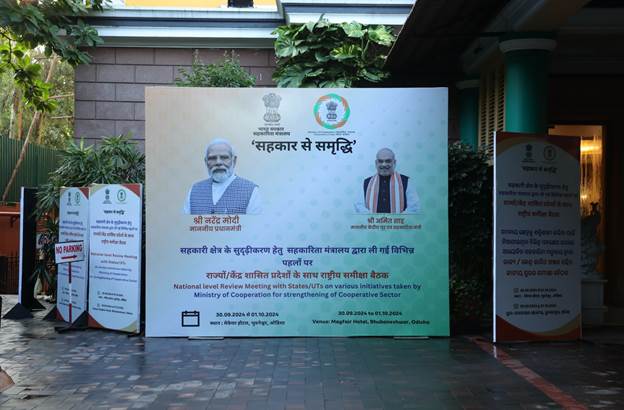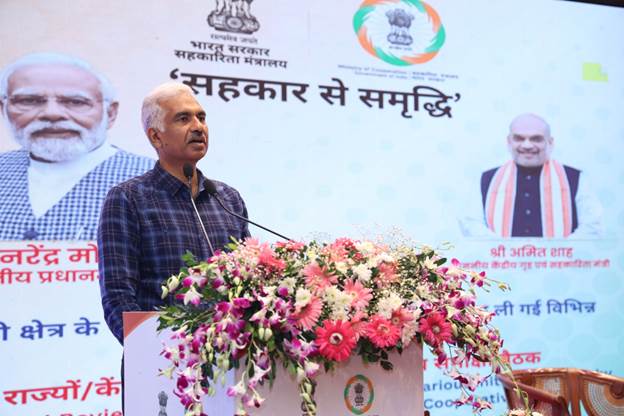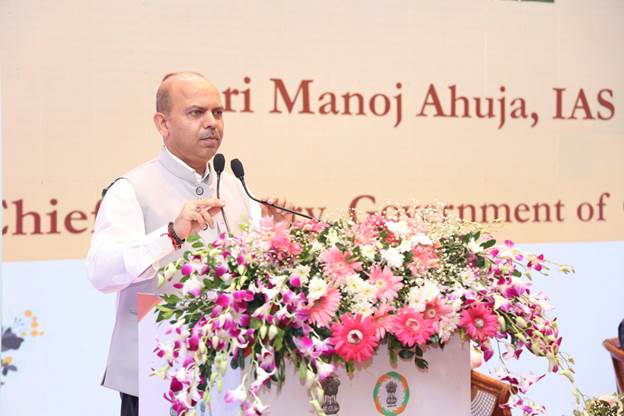With an aim of empowering cooperatives in the country and strengthening cooperative societies in rural areas, two-day national review meeting organized by Ministry of Cooperation successfully concluded in Bhubaneswar, Odisha today. The meeting was inaugurated by Shri Manoj Ahuja, Chief Secretary of the Odisha Government, and Dr. Ashish Kumar Bhutani, Secretary, Ministry of Cooperation was present as a distinguished guest.

One of the key agenda of the national review meeting was to ensure the smooth implementation of SOPs on 3 major initiatives launched by Union Home Minister and Minister of Cooperation Shri Amit Shah recently, in every village/panchayat and to start this work at the grassroots level at the earliest.
The SOPs on 3 major initiatives launched by Union Home Minister and Minister of Cooperation, include formation and strengthening of 2 lakh new MPACS, Dairy and Fishery Cooperatives, Standard Operating Procedures (SOPs) on ‘White Revolution 2.0’ and ‘Cooperation among Cooperatives’. The goal of making PACS a vibrant economic unit by providing them opportunities for national and international exports was also discussed in the two-day review meeting.
Among the ten initiatives taken by the Ministry of Cooperation in the first 100 days of the government, three major initiatives were launched by Union Home Minister and Minister of Cooperation Shri Amit Shah during National Conference in New Delhi, recently.
The meeting aimed to deliberate on the successful implementation of the ministry’s 100-day action plan. It was discussed that participation of youth is very important for promoting cooperative start-ups. Increasing youth participation in cooperative societies, modernizing cooperative education and training systems is very important in the coming days.
Shri Manoj Ahuja, Chief Secretary, Govt. of Odisha emphasized on the critical need for formation and promotion of Strong institutions at the grass root levels wherein all basic needs like quality inputs, storage structures, processing facilities, credit facilities and marketing facilities of the local people can be fulfilled.

Exemplifying Amul like Multi-State Cooperative Societies, he said that the various schemes and initiatives of Ministry of Cooperation, like Model byelaws, computerization, Jan Aushadhi Kendras, have transformed these Cooperative Societies into a One Stop Shop catering to all the needs of farmers under one roof. Being Peoples’ own organization Cooperative Societies have a huge potential.
Secretary, Ministry of Cooperation Dr. Ashish Kumar Bhutani highlighted the pivotal role of Cooperative Societies in contributing towards the GDP. In this direction, he emphasized on formation of MPACS by adoption of Model Bye Laws as an important initiative of Ministry of Cooperation. The Model Bye laws adoption has enabled PACS to become multi-dimensional being able to work in 25 new business avenues that will economically strengthen the PACS. Further, the formation of 3 New Cooperative Societies, NCEL, NCOL and BBSSL has broadened the horizon for PACS. These societies will support farmers in getting remunerative prices of their produce including organic products in national and international markets.

He explained, as a major step, Ministry of Cooperation has worked on digitization through NCD Database for real time data collection and planning for creation of a seamless structure for smooth monitoring and implementation of the initiatives nation-wide.
Dr. Bhutani said that to further strengthen the Cooperative Movement in the country, regular capacity building trainings are being organized with a vision to train 50% of cooperative members in next 5 years. He also requested Cooperative Departments of all the States and UTs to participate in the International Cooperative alliance planned to be held in November, 2024.
 Matribhumi Samachar English
Matribhumi Samachar English


